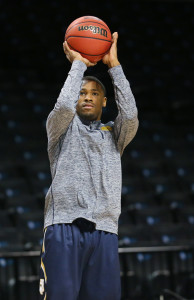OVERVIEW: Demetrius Jackson took over as Notre Dame’s floor leader as a junior and emerged as a first-round prospect. Jackson led the Irish to the Elite Eight despite some struggles offensively during the latter stages of the season. He finished his college career with a 26-point performance against North Carolina and averaged 15.8 points, 4.7 assists, 3.5 rebounds and 1.2 steals for the season. Jackson played steady minutes as a sophomore, though current Knicks point guard Jerian Grant was the team’s primary ballhandler. Jackson was also a rotation player as a freshman after being a highly touted prep star, ranking No. 33 overall in his class, according to the Recruiting Services Consensus Index. At 6’1”, the 21-year-old Jackson is smaller than the prototypical NBA point guard.
STRENGTHS: Like most smaller point guards, Jackson relies on his quickness and athleticism. He’s got superior explosion, allowing him to get into the paint and create havoc. That will serve him well in a pick-and-roll reliant NBA scheme. It also works well in the transition game, where he’s nearly impossible to catch as he converts layups or finds trailers for dunks. ESPN Insider Chad Ford credits Jackson for his pass-first mentality, decision-making and a knack for making his teammates better. DraftExpress’ Jonathan Givony notes that while Jackson is small, he’s powerfully built and can finish through contact. His outstanding leaping ability allows him to be on the receiving end of lobs. He also moves well without the ball and is a solid shooter off the catch, with Givony pointing out that he made 41% of his shots with his feet set. Turnovers were not a big issue for Jackson, as he averaged 2.2 as a junior while playing 36 minutes per game. Jackson has also impressed talent evaluators with his competitiveness, according to NBA.com’s David Aldridge.
WEAKNESSES: Jackson’s 3-point shooting dropped off dramatically when tasked with running Notre Dame’s methodical offense this season. He made 33.1% of his long-range shots as a junior, compared to 42.9% in his sophomore year. Jackson’s lack of height could obviously be an issue when he’s guarding tall point guards, and he’ll be an even bigger liability when he’s forced to switch. Jackson can also be over-reliant on his quickness, rather than playing at a more controlled pace. As one NBA executive told Aldridge, “He always tries to blow by you. It’s like a pitcher that keeps throwing 100 miles an hour.” In contrast to Ford’s evaluation, Givony believes that Jackson has displayed average court vision and misses some easy reads. That’s due to Jackson still searching for the right balance between running the offense and finding his own shot.
For Part 2 of our Demetrius Jackson Prospect Profile, click here.
